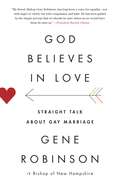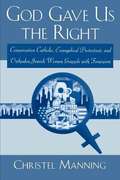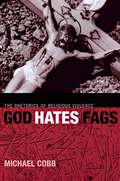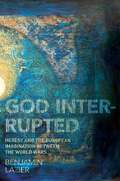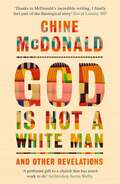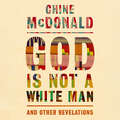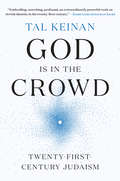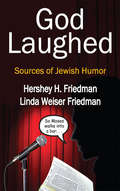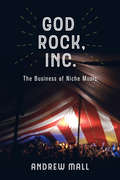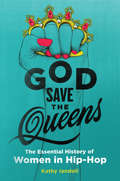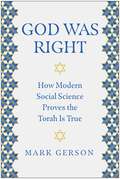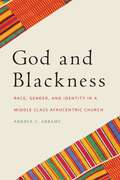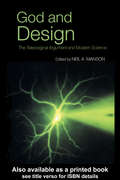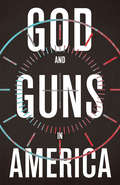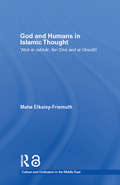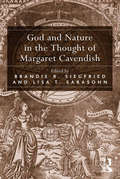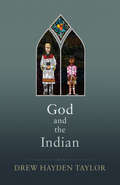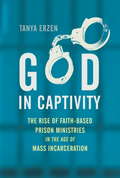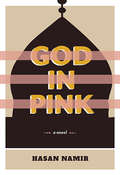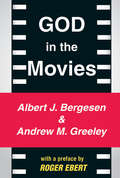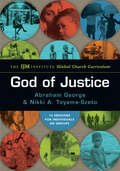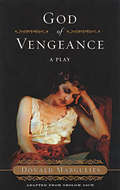- Table View
- List View
God Believes in Love: Straight Talk About Gay Marriage
by Gene RobinsonFrom the Bishop of the Diocese of New Hampshire in the Episcopal Church, the first openly gay person elected (in 2003) to the historic episcopate and the world's leading religious spokesperson for gay rights and gay marriage--a groundbreaking book that lovingly and persuasively makes the case for same-sex marriage using a commonsense, reasoned, religious argument, made by someone who holds the religious text of the Bible to be holy and sacred and the ensuing two millennia of church history to be relevant to the discussion, equally familiar with the secular and political debate going on in America today, and for whom same-sex marriage is a personal issue; Robinson was married to a woman for two decades and is a father of two children and has been married to a man for the last four years of a twenty-three-year relationship.
God Gave Us the Right: Conservative Catholic, Evangelical Protestant, and Orthodox Jewish Women Grapple with Feminism
by Christel J. ManningDrawing on two years of ethnographic research in Catholic, Evangelical Protestant, and Jewish communities, the author explores the diversity of views among women who have returned to tradition. Arguing that America has undergone profound cultural and economic changes in the last 30 years that have created tension between women's lives and traditional gender roles, she demonstrates how religious conservative women negotiate these tensions. Manning is an assistant professor of religion at Sacred Heart University. Annotation c. Book News, Inc., Portland, OR (booknews.com)
God Hates Fags: The Rhetorics of Religious Violence (Sexual Cultures #20)
by Michael Cobb2007 Choice Outstanding Academic TitleAt the funeral of Matthew Shepard—the young Wyoming man brutally murdered for being gay—the Reverend Fred Phelps led his parishioners in protest, displaying signs with slogans like “Matt Shepard rots in Hell,” “Fags Die God Laughs,” and “God Hates Fags.” In counter-protest, activists launched an “angel action,” dressing in angel costumes, with seven-foot high wings, and creating a visible barrier so one would not have to see the hateful signs.Though long thought of as one of the most virulently anti-gay genres of contemporary American politics and culture, in God Hates Fags, Michael Cobb maintains that religious discourses have curiously figured as the most potent and pervasive forms of queer expression and activism throughout the twentieth century. Cobb focuses on how queers have assumed religious rhetoric strategically to respond to the violence done against them, alternating close readings of writings by James Baldwin, Tennessee Williams, Jean Toomer, Dorothy Allison, and Stephen Crane with critical legal and political analyses of Supreme Court Cases and anti-gay legislation. He also pays deep attention to the political strategies, public declarations, websites, interviews, and other media made by key religious right organizations that have mounted the most successful regulations and condemnations of homosexuality.
God Interrupted: Heresy and the European Imagination between the World Wars
by Benjamin LazierCould the best thing about religion be the heresies it spawns? Leading intellectuals in interwar Europe thought so. They believed that they lived in a world made derelict by God's absence and the interruption of his call. In response, they helped resurrect gnosticism and pantheism, the two most potent challenges to the monotheistic tradition. In God Interrupted, Benjamin Lazier tracks the ensuing debates about the divine across confessions and disciplines. He also traces the surprising afterlives of these debates in postwar arguments about the environment, neoconservative politics, and heretical forms of Jewish identity. In lively, elegant prose, the book reorients the intellectual history of the era. God Interrupted also provides novel accounts of three German-Jewish thinkers whose ideas, seminal to fields typically regarded as wildly unrelated, had common origins in debates about heresy between the wars. Hans Jonas developed a philosophy of biology that inspired European Greens and bioethicists the world over. Leo Strauss became one of the most important and controversial political theorists of the twentieth century. Gershom Scholem, the eminent scholar of religion, radically recast what it means to be a Jew. Together they help us see how talk about God was adapted for talk about nature, politics, technology, and art. They alert us to the abiding salience of the divine to Europeans between the wars and beyond--even among those for whom God was long missing or dead.
God Is Not a White Man: And Other Revelations
by Chine McDonaldWhat does it mean when God is presented as male? What does it mean when - from our internal assumptions to our shared cultural imaginings - God is presented as white? These are the urgent questions Chine McDonald asks in a searing look at her experience of being a Black woman in the white-majority space that is the UK church - a church that is being abandoned by Black women no longer able to grin and bear its casual racism, colonialist narratives and lack of urgency on issues of racial justice. Part memoir, part social and theological commentary, God Is Not a White Man is a must-read for anyone troubled by a culture that insists everyone is equal in God's sight, yet fails to confront white supremacy; a lament about the state of race and faith, and a clarion call for us all to do better.'This book is much-needed medicine for a sickness that we cannot ignore.' - The Most Rev. Michael B. Curry
God Is Not a White Man: And Other Revelations
by Chine McDonaldWhat does it mean when God is presented as male? What does it mean when - from our internal assumptions to our shared cultural imaginings - God is presented as white? These are the urgent questions Chine McDonald asks in a searing look at her experience of being a Black woman in the white-majority space that is the UK church - a church that is being abandoned by Black women no longer able to grin and bear its casual racism, colonialist narratives and lack of urgency on issues of racial justice. Part memoir, part social and theological commentary, God Is Not a White Man is a must-read for anyone troubled by a culture that insists everyone is equal in God's sight, yet fails to confront white supremacy; a lament about the state of race and faith, and a clarion call for us all to do better.'This book is much-needed medicine for a sickness that we cannot ignore.' - The Most Rev. Michael B. Curry
God Is Not a White Man: And Other Revelations
by Chine McDonaldPart memoir, part social and theological commentary on what it means to be a black Christian woman in the UKWhat does it mean when God is presented as male? What does it mean when - from our internal assumptions to our shared cultural imaginings - God is presented as white? These are the urgent questions Chine McDonald asks in a searing look at her experience of being a Black woman in the white-majority space that is the UK church - a church that is being abandoned by Black women no longer able to grin and bear its casual racism, colonialist narratives and lack of urgency on issues of racial justice. Part memoir, part social and theological commentary, God Is Not a White Man is a must-read for anyone troubled by a culture that insists everyone is equal in God's sight, yet fails to confront white supremacy; a lament about the state of race and faith, and a clarion call for us all to do better.(P) 2021 Hodder & Stoughton Ltd
God Is in the Crowd: Twenty-First-Century Judaism
by Tal Keinan“Enthralling, searching, profound, an extraordinarily powerful work on Jewish identity in the twenty-first century.”—Rabbi Lord Jonathan SacksA bold proposal for discovering relevance in Judaism and ensuring its survival, from a pioneering social activist, business leader, and fighter pilot in the Israeli Air Force God Is in the Crowd is an original and provocative blueprint for Judaism in the twenty-first century. Presented through the lens of Tal Keinan’s unusual personal story, it a sobering analysis of the threat to Jewish continuity. As the Jewish people has become concentrated in just two hubs—America and Israel—it has lost the subtle code of governance that endowed Judaism with dynamism and relevance in the age of Diaspora. This code, as Keinan explains, is derived from Francis Galton’s “wisdom of crowds,” in which a group’s collective intelligence, memory, and even spirituality can be dramatically different from, and often stronger than, that of any individual member’s. He argues that without this code, this ancient people—and the civilization that it spawned—will soon be extinct. Finally, Keinan puts forward a bold and original plan to rewrite the Jewish code, proposing a new model for Judaism and for community in general. Keinan was born to a secular Jewish family in Florida. His interest in Judaism was ignited by a Christian minister at his New England prep school and led him down the unlikely path to enlistment in the Israel Air Force. Using his own dramatic experiences as a backdrop, and applying lessons from his life as a business leader and social activist, Keinan takes the reader on a riveting adventure, weaving between past, present, and future, and fusing narrative with theory to demonstrate Judaism’s value to humanity and chart its path into the future.Advance praise for God Is in the Crowd“Beautifully written, brilliantly argued, this is a unique contribution to the conversation and a must read for anyone concerned with Tribal continuity.”—Yossi Klein Halevi, author of Letters to My Palestinian Neighbor“God Is in the Crowd blends social science, economics, religion, and national identity to help us see more clearly who we are as individuals, people, and a society.”—Dan Ariely, author of The Upside of Irrationality“American, Israeli, entrepreneur, fighter pilot, and investor: Keinan’s diagnosis of Israel and the Jewish Diaspora is provided through the lens of a rich and gripping life story. Keinan’s contribution is indispensable to the debate about the future of the Jewish people.”—Dan Senor, co-author of Start-up Nation
God Laughed: Sources of Jewish Humor (Jewish Studies)
by Hershey H. FriedmanHumor has had a profound effect on the way the Jewish people see the world, and has sustained them through millennia of hardships and suffering. God Laughed reviews, organizes, and categorizes the humor of the ancient Jewish texts-the Hebrew Bible, the Talmud, and Midrash-in a clear, readable, and accessible manner. These works have influenced the Jewish people in many ways, and all are replete with humor and wit. Inevitably, this oeuvre of Jewish humor has itself influenced generations of comics, as well as genres of humor. The authors use examples of Biblical humor from several broad categories, including irony, sarcasm, wordplay, humorous names, humorous imagery, and humorous situations. Because their primary purpose is not to entertain, but to teach humanity how to live the ideal life, much of the humor in the Talmud and the Midrash has a single purpose: to demonstrate that evil is wrong and even, at times, ludicrous. This may help explain why approximately 1,500 years after its closing, the Talmud is still such a fascinating work.
God Rock, Inc.: The Business of Niche Music
by Andrew MallPopular music in the twenty-first century is increasingly divided into niche markets. How do fans, musicians, and music industry executives define their markets’ boundaries? What happens when musicians cross those boundaries? What can Christian music teach us about commercial popular music? In God Rock, Inc., Andrew Mall considers the aesthetic, commercial, ethical, and social boundaries of Christian popular music, from the late 1960s, when it emerged, through the 2010s. Drawing on ethnographic research, historical archives, interviews with music industry executives, and critical analyses of recordings, concerts, and music festival performances, Mall explores the tensions that have shaped this evolving market and frames broader questions about commerce, ethics, resistance, and crossover in music that defines itself as outside the mainstream.
God Save the Queens: The Essential History of Women in Hip-Hop
by Kathy IandoliJournalist Kathy Iandoli’sGod Save the Queens is the “rigorous, insightful, and authoritative . . . [and] deadly personal”* history of women in hip-hop.An *NPR Best Book of the YearEvery history of hip-hop focuses primarily on men, glaringly omitting a thorough and respectful examination of the presence and contribution of the genre’s female artists. For far too long, women in hip-hop have been relegated to the shadows, viewed as the designated “First Lady” thrown a contract, a pawn in some beef, or even worse. But as Kathy Iandoli makes clear, the reality is very different. Today, hip-hop is dominated by successful women such as Cardi B and Nicki Minaj, yet there are scores of female artists whose influence continues to resonate.God Save the Queens pays tribute to the women of hip-hop—from the early work of Roxanne Shante, to hitmakers like Queen Latifah and Missy Elliot, to the superstars of today. Exploring issues of gender, money, sexuality, violence, body image, feuds, objectification and more, this is an important and monumental work of music journalism that at last gives these influential female artists the respect they have long deserved.“Music lovers will celebrate this much-needed exploration of the overlooked experiences of women in hip-hop.” —Publishers Weekly“Intended to be a narrative homage to women in hip-hop, this latest work by Iandoli is that and more. . . . [She] gives female artists the recognition they deserve, while showing that there is still work to do.” —Library Journal
God Was Right: How Modern Social Science Proves the Torah Is True
by Mark GersonCan the Torah—a 3,000-year-old book—really ask and answer the most interesting and important questions in contemporary life?For three millennia, individuals in all walks of life have asked the same question: Is the Torah true? Entrepreneur, philanthropist and Biblical teacher Mark Gerson has found a new, unique, and only now possible way to answer that question. In God Was Right, Gerson examines the Torah on the basis of what it declares itself to be—a guidebook, which identifies, asks and answers the practical, relevant and important questions that enable us to live our best lives. Gerson shows in detail that the Torah&’s questions and claims are exactly those asked and investigated by modern social scientists. Their work has enabled perhaps the biggest discovery of all: The Torah is true—absolutely, comprehensively, and enthusiastically so. This extensive, revelatory, and fascinating exploration into the truth of the Torah features: Answers to life&’s questions, such as: How long should I date before getting married? What should I do when I&’m angry or offended? Can I become a better person? How can I help my child succeed in school? How should I allocate my time? How can I become happier? Surprising insights on contemporary activities, including insurance rates, casual sex, hockey uniforms, educational outcomes, and basketball championships An examination of social phenomena including peer pressure, antifragility, diversity, fear, future orientation, reframing, victimization and the key to personal transformation Suitable for reading chapter by chapter, or for focusing only on a particular subject of interest, God Was Right is an extraordinary book that will enlighten, inspire, and delight every reader.
God and Blackness: Race, Gender, and Identity in a Middle Class Afrocentric Church
by Andrea C. AbramsBlackness, as a concept, is extremely fluid: it can refer to cultural and ethnic identity, socio-political status, an aesthetic and embodied way of being, a social and political consciousness, or a diasporic kinship. It is used as a description of skin color ranging from the palest cream to the richest chocolate; as a marker of enslavement, marginalization, criminality, filth, or evil; or as a symbol of pride, beauty, elegance, strength, and depth. Despite the fact that it is elusive and difficult to define, blackness serves as one of the most potent and unifying domains of identity. God and Blackness offers an ethnographic study of blackness as it is understood within a specific community—that of the First Afrikan Church, a middle-class Afrocentric congregation in Atlanta, Georgia. Drawing on nearly two years of participant observation and in‑depth interviews, Andrea C. Abrams examines how this community has employed Afrocentrism and Black theology as a means of negotiating the unreconciled natures of thoughts and ideals that are part of being both black and American. Specifically, Abrams examines the ways in which First Afrikan’s construction of community is influenced by shared understandings of blackness, and probes the means through which individuals negotiate the tensions created by competing constructions of their black identity. Although Afrocentrism operates as the focal point of this discussion, the book examines questions of political identity, religious expression and gender dynamics through the lens of a unique black church.
God and Design: The Teleological Argument and Modern Science
by Neil A. MansonRecent discoveries in physics, cosmology, and biochemistry have captured the public imagination and made the Design Argument - the theory that God created the world according to a specific plan - the object of renewed scientific and philosophical interest. This accessible but serious introduction to the design problem brings together new perspectives from prominent scientists and philosophers including Paul Davies, Richard Swinburne, Sir Martin Rees, Michael Behe, Elliot Sober and Peter van Inwagen.It probes the relationship between modern science and religious belief, considering their points of conflict and their many points of similarity. Is the real God of creationism the 'master clockmaker' who sets the world's mechanism on a perfectly enduring course, or a miraculous presence who continually intervenes in and alters the world we know? Are science and faith, or evolution and creation, really in conflict at all? Expanding the parameters of a lively and urgent debate, God and Design considers how perennial questions of origin continue to fascinate and disturb us.
God and Guns in America
by Michael W. AustinWhat if Christians did more than offer thoughts and prayers in response to gun violence? Ethicist Michael Austin argues—from a biblical but nonpacifist perspective—that we can impose firearms restrictions to make our society safer and less fearful while still respecting the rights of gun owners. God and Guns in America is a thoughtful, measured, and articulate treatment of a polarizing topic that is too often treated with more heat than light.
God and Guns in America
by Michael W. AustinWhat if Christians did more than offer thoughts and prayers in response to gun violence? Ethicist Michael Austin argues—from a biblical but nonpacifist perspective—that we can impose firearms restrictions to make our society safer and less fearful while still respecting the rights of gun owners. God and Guns in America is a thoughtful, measured, and articulate treatment of a polarizing topic that is too often treated with more heat than light.
God and Humans in Islamic Thought: Abd Al-Jabbar, Ibn Sina and Al-Ghazali (Culture and Civilization in the Middle East)
by Maha Elkaisy-FriemuthWinner of The Iranian World Prize for the Book of the Year 2007 in the Philosophy and Mysticism category. This new and original text provides a timely re-examination of Islamic thought, presenting a stark contrast to the more usual conservative view. The explanation of the relationship between God and humans, as portrayed in Islam, is often influenced by the images of God and of human beings which theologians, philosophers and mystics have in mind. The early period of Islam reveals a diversity of interpretations of this relationship. Elkaisy-Friemuth discusses the view of three scholars from the tenth and eleventh century: Abd al-Jabbar, Ibn Sina and Al-Ghazali, which introduce three different approaches of looking at the relationship between God and Humans. God and Humans in Islamic Thought attempts to shed light on an important side of medieval rational thought in demonstrating its significance in forming the basis of an understanding of the nature of God, the nature of human beings and the construction of different bridges between them.
God and Logic in Islam
by John WalbridgeThis book investigates the central role of reason in Islamic intellectual life. Despite widespread characterization of Islam as a system of belief based only on revelation, John Walbridge argues that rational methods, not fundamentalism, have characterized Islamic law, philosophy, and education since the medieval period. His research demonstrates that this medieval Islamic rational tradition was opposed by both modernists and fundamentalists, resulting in a general collapse of traditional Islamic intellectual life and its replacement by more modern but far shallower forms of thought. However, the resources of this Islamic scholarly tradition remain an integral part of the Islamic intellectual tradition and will prove vital to its revival. The future of Islam, Walbridge argues, will be marked by a return to rationalism.
God and Nature in the Thought of Margaret Cavendish
by Lisa T. Sarasohn Brandie R. SiegfriedOnly recently have scholars begun to note Margaret Cavendish’s references to 'God,' 'spirits,' and the 'rational soul,' and little has been published in this regard. This volume addresses that scarcity by taking up the theological threads woven into Cavendish’s ideas about nature, matter, magic, governance, and social relations, with special attention given to Cavendish’s literary and philosophical works. Reflecting the lively state of Cavendish studies, God and Nature in the Thought of Margaret Cavendish allows for disagreements among the contributing authors, whose readings of Cavendish sometimes vary in significant ways; and it encourages further exploration of the theological elements evident in her literary and philosophical works. Despite the diversity of thought developed here, several significant points of convergence establish a foundation for future work on Cavendish’s vision of nature, philosophy, and God. The chapters collected here enhance our understanding of the intriguing-and sometimes brilliant-contributions Cavendish made to debates about God’s place in the scientific cosmos.
God and the Indian
by Drew Hayden TaylorWhile panhandling outside a coffee shop, Johnny, a Cree woman, is shocked to recognize a face from her childhood, which was spent in a Native American boarding school. Desperate to hear him acknowledge the terrible abuse inflicted on her and other children at the school, Johnny follows Anglican assistant bishop George King to his office to confront him.Ojibway writer Drew Hayden Taylor is the author of twenty-one publications. Hailed by the Montreal Gazette as one of Canada's leading Native dramatists, he writes for the screen and the stage, and contributes regularly to national newspapers.
God in Captivity: The Rise of Faith-Based Prison Ministries in the Age of Mass Incarceration
by Tanya ErzenAn eye-opening account of how and why evangelical Christian ministries are flourishing in prisons across the United StatesIt is by now well known that the United States’ incarceration rate is the highest in the world. What is not broadly understood is how cash-strapped and overcrowded state and federal prisons are increasingly relying on religious organizations to provide educational and mental health services and to help maintain order. And these religious organizations are overwhelmingly run by nondenominational Protestant Christians who see prisoners as captive audiences.Some twenty thousand of these Evangelical Christian volunteers now run educational programs in over three hundred US prisons, jails, and detention centers. Prison seminary programs are flourishing in states as diverse as Texas and Tennessee, California and Illinois, and almost half of the federal prisons operate or are developing faith-based residential programs. Tanya Erzen gained inside access to many of these programs, spending time with prisoners, wardens, and members of faith-based ministries in six states, at both male and female penitentiaries, to better understand both the nature of these ministries and their effects. What she discovered raises questions about how these ministries and the people who live in prison grapple with the meaning of punishment and redemption, as well as what legal and ethical issues emerge when conservative Christians are the main and sometimes only outside forces in a prison system that no longer offers even the pretense of rehabilitation. Yet Erzen also shows how prison ministries make undeniably positive impacts on the lives of many prisoners: men and women who have no hope of ever leaving prison can achieve personal growth, a sense of community, and a degree of liberation within the confines of their cells.With both empathy and a critical eye, God in Captivity grapples with the questions of how faith-based programs serve the punitive regime of the prison, becoming a method of control behind bars even as prisoners use them as a lifeline for self-transformation and dignity.
God in Pink
by Hasan NamirA revelatory novel about being queer and Muslim, set in war-torn Iraq in 2003. Ramy is a young gay Iraqi struggling to find a balance between his sexuality, religion, and culture. Ammar is a sheikh whose guidance Ramy seeks, and whose tolerance is tested by his belief in the teachings of the Qur'an. Full of quiet moments of beauty and raw depictions of violence, God in Pink poignantly captures the anguish and the fortitude of Islamic life in Iraq.Hasan Namir was born in Iraq in 1987. God in Pink is his first novel.
God in the Movies
by Andrew M. GreeleyThe religious imagination is alive and well in the movies. Contrary to those who criticize Hollywood, popular movies very often have metaphorically represented God on the screen. From Clint Eastwood as an avenging angel in Pale Rider and Nicolas Cage as a lovesick angel in City of Angels to Jessica Lange as an angel of death in All That Jazz, and from George Burns as God in Oh, God! to Audrey Hepburn in Always to pure white light in Fearless and Flatliners, God is very much present in the movies.
God of Justice: The IJM Institute Global Church Curriculum
by Abraham GeorgeThe level of injustice in the world is staggering. The church can respond. International Justice Mission (IJM) has rescued thousands of people from oppression and violence. IJM also partners with thousands of churches to help them live out the mandate of Isaiah 1:17: to seek justice, rescue the oppressed and care for orphans and widows. Christians need to be equipped and mobilized to be the hands and feet of Jesus to those who are vulnerable and oppressed. The God of Justice is a twelve-session, discussion-based curriculum from IJM that explores the biblical narrative of justice throughout the whole of Scripture, from Genesis to Revelation. Through the participatory study of Scripture, Christians will explore God's call to engage in bringing about justice on earth. While coming to a deeper knowledge and understanding of biblical justice, participants will draw personal application for the pursuit of justice ministry in their individual lives and the wider church. Prepare to have your heart and mind engaged, to be instructed by Scripture, and to be challenged by real-life stories of people freed by the God of justice. This curriculum will help you and your church bring freedom, restoration and reconciliation to those in need. Discover how God reveals himself to those who join him on his justice journey!
God of Vengeance
by Donald Margulies Sholom AschDonald Margulies offers up a vivid new adaptation of Sholom Asch's 1906 Yiddish melodrama, reset on the Lower East Side of New York at the turn of the century. The original English language edition first appeared on Broadway in 1923, but was closed down and the cast arrested for its portrayal of a lesbian love affair on stage."Teasing out the pesky questions of spirit, love, family and commerce at the heart of Asch's play, Margulies has achieved crossover success, making God of Vengeance a profoundly American play."--Alisa Solomon, Village Voice Sholom Asch was a noted Yiddish novelist and playwright.Donald Margulies is the Pulitzer Prize-winning author of Dinner with Friends. His other work includes Collected Stories and Sight Unseen.
